Overkill's The Walking Dead Review
Dead weight
While not as far reaching as franchises such as Marvel or DC, The Walking Dead has arguably become one of the best known entertainment properties of this decade. What started off as a popular comic quickly gained mainstream success thanks to AMC's TV show, and the excellent game series from Telltale. At its peak, this zombie survival series was one of the most talked about in entertainment. However, some will argue that the good times are coming to an end – both the TV show and the game series have been on a decline, and audiences have moved on. Overkill's The Walking Dead arrives in this peculiar time for the franchise, and it sadly offers no saving grace with some clunky gameplay and a poor use of the license.
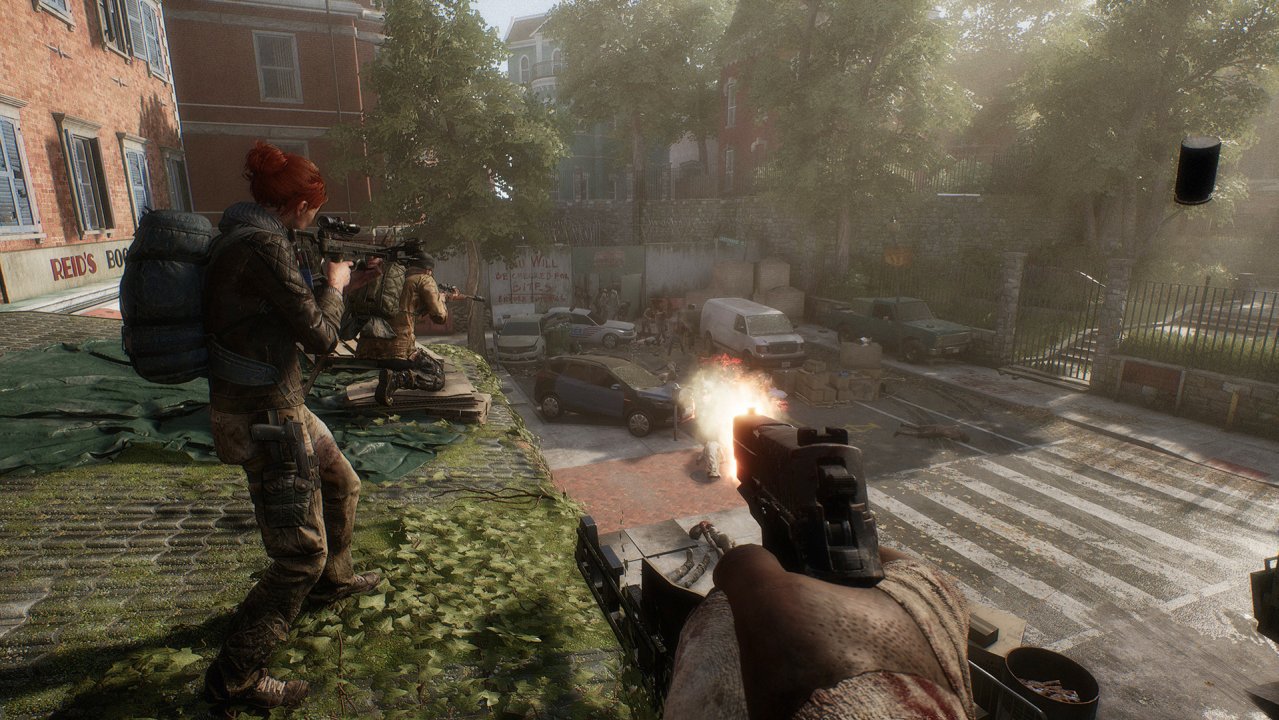
Despite having the name on the box, Overkill's title doesn't utilize any characters or events from the universe. Players follow a group of survivors who are trying to make it in a zombie-infested Washington D.C., while also fighting back hostile human groups. Before each story mission, you get a brief stylized cutscene that describes what you're about to do and why – rescue an important survivor, steal supplies, push back against an assault, and so on. This is a multiplayer focused title, so expecting an engaging story is probably a mistake, but the game does so little with the narrative that it could have easily been a generic zombie title. The narrative is lackluster and the dramatic events, that you hear about during cutscenes, offer no emotional weight.
The campaign is progressed by undertaking individual missions that appear on the city map. Each mission is a standalone experience, and can last anywhere between 10 and 30+ minutes, depending on the type. In shorter missions, your task is to protect the base from an assault. The annoyance here is that enemies spawn randomly, and whatever few defensive items you deploy (barbed wire or barricades) make little difference. Enemies can spawn anywhere – at the gates, or inside the compound – making for a hectic brawl rather than something you can plan for. They often appear from a multitude of black hole doors, so you can get ambushed from behind at any time.
The longer missions offer linear but multi-path levels, where you're going to traverse a few different streets on the way to the goal. The game tries to switch things up by occasionally offering puzzles to open doors, such as needing to flip switches in a certain order, or having to collect a few parts to make a generator or forklift run again. While the specifics may change when you replay a level, they are always in the same spot, so there's little to be excited about. You also come across lockboxes or doors that need a specific tool to open that you choose pre-deployment, like cutters, lockpick, or chem kit. Since these are randomized, you can't plan to bring a specific tool, so it's best to have each member of the squad carry something different.
The longer levels utilize a fairly unique zombie alert mechanic. Using unsilenced weapons or activating noise traps will bring their attention and spawn more undead for you to battle. If you reach level three alert, the entire horde descends on the area and you might as well give up, as finishing the mission will be very difficult and take forever. The issue with this mechanic is that it's completely ruined by human enemies. While your squad might stealth through the entire level, as soon as you're spotted by enemy AI, they open fire with unsilenced assault rifles and this boosts the alert level fast. Further, the game loses believability and atmosphere as it's only gunfire that the zombies are attracted to; you'll frequently open creaky large gates, or lift entire subway cars off the tracks, and this doesn't add to the alert meter.
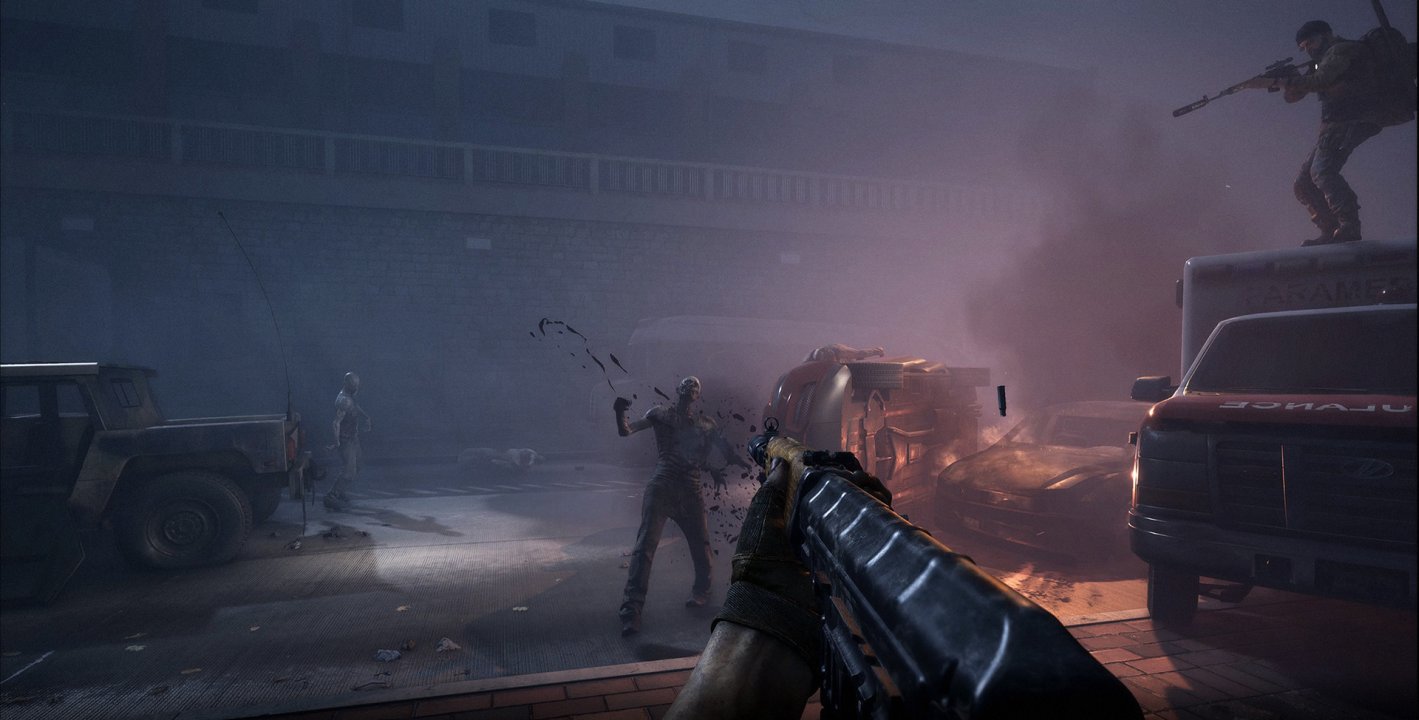
None of these enemies are fun to battle against. OTWD tries to promote itself as a slow paced and challenging game, but that difficulty comes from frustrating mechanics rather than needing a higher level of skill or communication. Battling zombies is repetitive and shallow – you just bash them on the head with a melee weapon until they fall over, and there are just three different types that mostly behave the same: bloaters that explode, or armored undead The only way zombies do damage is if they grab you, at which point you enter an awkward shiv-or-push-away state. The mere act of getting grabbed takes a huge chunk of your health, and the game lacks maneuverability options that are common in the genre. It's a slog to fight your way through a horde, and it loses all tension after just a couple of missions.
When the rifles need to come out, either against humans or when you're getting overwhelmed by the walkers, the shooting mechanics are disappointing. The guns don't feel like they pack a punch, and you have absolutely no ammo to work with. In long missions, collecting ammo from loot gives you a laughable 5 bullets, which is pointless. In the short enclosed missions, you can resupply from respawning crates, but they are shared between players, so if someone else gets there first, you have to make your way to another area for ammo. During moments of downtime, you'll scavenge the environment for materials to craft additional utility items, or find weapon/mod crates to bring with you to the end of the level.
Whether you're battling the zombies or the humans, the AI is rather braindead. The zombies do a decent job of shuffling towards players, occasionally pausing, and changing direction if someone else makes noise. The human enemies though are rather dumb and behave in extremely simple ways. They run, stop in the open, sprint for cover, or just stand in place. Their ability to shoot ranges from superhuman to non-existent in the space of two bullets, which again adds to the superficial difficulty. It's some of the silliest and most basic enemy AI you'll probably see this year, let alone in a full priced game. But perhaps the most aggravating aspect is the friendly AI. You will often be tasked with escorting a survivor out of the level, and their completely terrible pathfinding will leave you screaming in agony – or worse yet, seething with rage if they get stuck, knocked down, and eventually cause you to fail the entire level. This, in addition to human enemies showing up and causing a level three horde to spawn from all the noise, makes for a very common case of the game forcing you to fail missions right at the end.
On missions, players can take control of one of four characters, though again, the game doesn't even introduce them, their background, or relevancy to the story. They are all just lifeless avatars that are used to represent the four gameplay classes. The differences between each class are their special ability, gadgets, and what weapon types they get bonuses from. Maya is the support class with healing and a preference for SMGs; Aiden is the tank that can absorb damage and prefers shotguns; Grant is the sniper with marking ability; and Heather is the tactician with a crossbow and keen eye for traps. The idea is that each hero fills a role within the team – however, because there are no limits, you'll often play along with multiples of the same character.
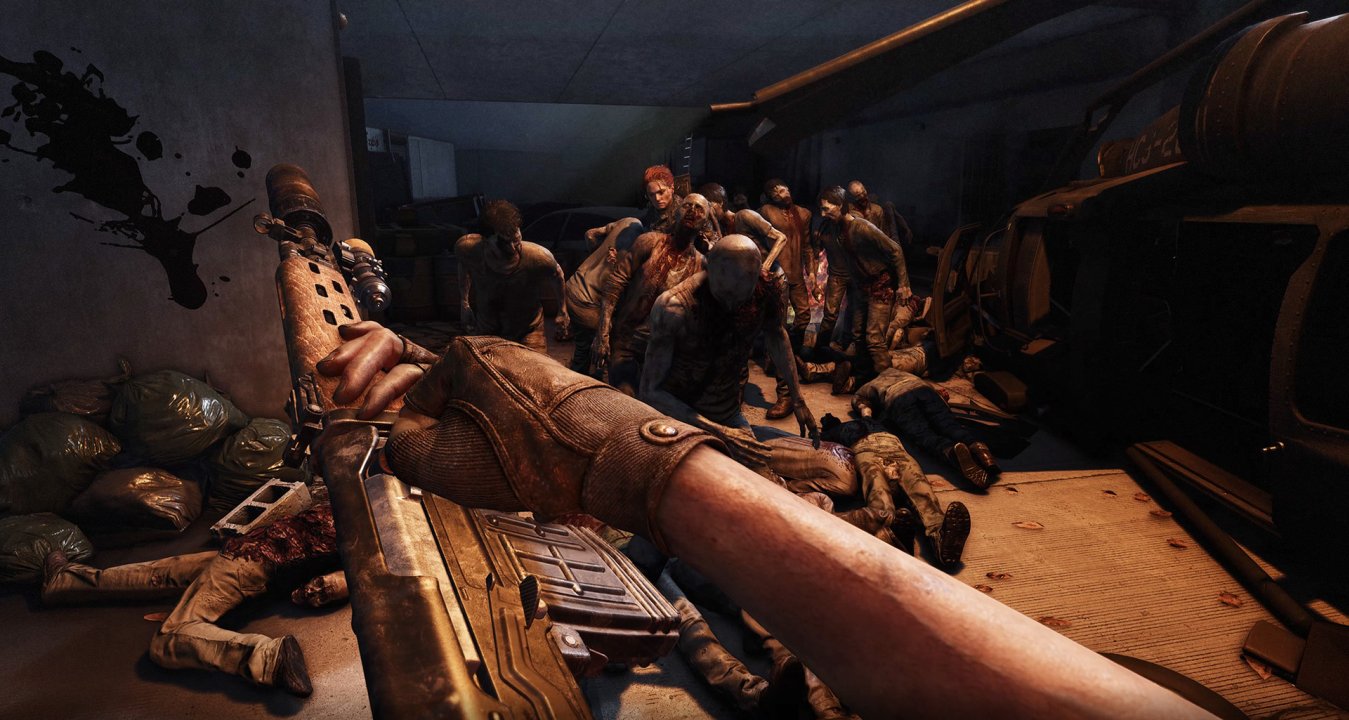
Each of the characters have their own unique skill tree for their ability, as well as a standard skill tree. As you earn experience, you can spend skill points to unlock passive bonuses such as more health, more starting ammo, more stamina, and so forth. The character-specific skill trees have features that let you perform that character's unique function better, like using Maya's healing bag more than once per deployment.
All of these character customizations and abilities seem like a decent idea on paper, but in practice the game just isn't all that dependant on teamwork as it wants to be, nor is it very flexible. You can get overwhelmed three times, after which you must wait 2 minutes or more to respawn, leaving the remaining players awkwardly wasting time and trying to survive. To get the most out of your character, it's best to stick with the same hero so you can level them up. The experience gain is extremely slow, and all characters have their own separate progress bar, meaning to get everyone up to speed will take multiple replays of most campaign missions. There is a ton of grind in OTWD, and missions grow more and more repetitive with every run. And because everyone has their weapon preferences (boosts), you'll also be using the same guns throughout so that you can be as efficient and as powerful as possible.
The skills that you can unlock are gated by the development of a camp. The survivor camp can be upgraded via the menus, or you can visit it in person, though there's nothing to do but walk around and access the same functions. You can upgrade five buildings (representative of the main camp level and each of the four character classes) to get some new passive boosts for the virtual survivors that live in your camp. You get these survivors randomly, and they can be sent out on assignments for resources, or added to a workshop to give you a passive boost in battle. But this entire base management aspect is very basic and can be ignored. The assignments produce absolutely tiny rewards, and managing your survivors does not feel rewarding.
To needlessly throw more mechanics into the mix, there is time progression, wherein completing missions advances time. If you fail a mission, time does not advance, and you get absolutely nothing except a little experience, making the process feel utterly unrewarding as you've wasted 30 minutes trying to fight your way through impossible odds just to come up empty. When time does progress, you lose resources every few days due to the needs of the camp.
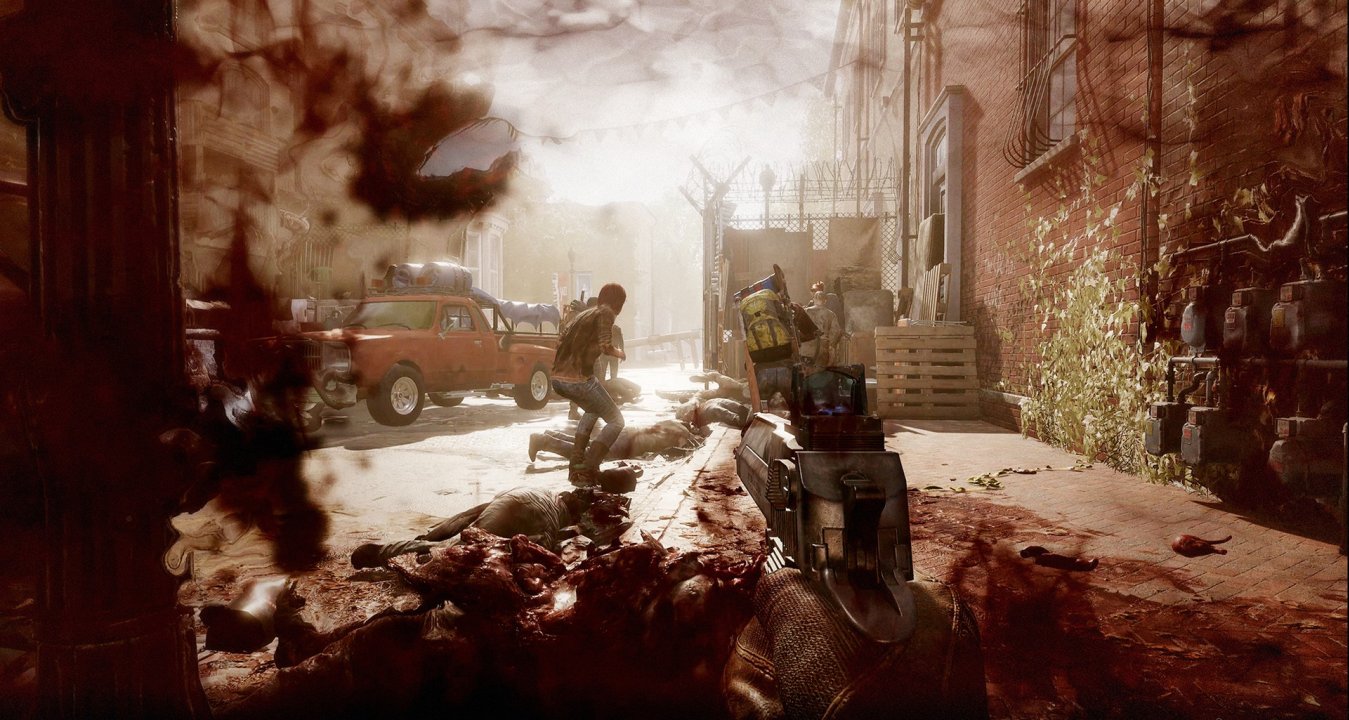
There's also an inventory system that holds all the weapons you own, which have stats and power levels. Weapon drops feel too infrequent, and you'll have a ton of mods, like flashlights and sights, but no guns to apply them on. Guns have different level requirements as well, and rarity levels, which define which attachments they can equip. Salvaging things you don't need produces an insultingly low amount of resources. And again to pile on the mechanics, weapons have a degradation system, so they need some resources to fix.
As a multiplayer-focused title, there's little to do here for solo enthusiasts. Going in solo is sure to prove extremely challenging and frustrating the deeper you go into the campaign. Plus, you must always be connected to the servers, even if you're trying to survive alone, and can't even reach the menus without being connected (not just to Steam, but Overkill's servers as well). With numerous connection issues experienced throughout the first two weeks after launch, the game hardly instills a sense of confidence.
When you do get into the level with four other players, with support for drop in/out, things only get marginally more entertaining. The matchmaking takes a while sometimes, and the deeper you go into the game, the less players you will encounter. With difficulty spikes and character power requirements rising quickly in the brief campaign, you'll have to frequently return to earlier missions to level up and get decent gear by choosing a higher difficulty setting. When things get tough, you only have text chat to rely on, as in-game voice chat is shockingly absent.
Technical issues are in abundance. There is plenty of lag, unexplained random stuttering, issues with players joining/leaving mid-level, long loading screens, zombies and players getting stuck or falling through the environment, just to name a few. It's a game that lacks polish in most aspects. Everything just feels clunky, and the full asking price is rather absurd. There is also no tutorial at all; a short video is available that glosses over some features like a sales pitch rather than an explanation. Players are pretty much left to their own devices to figure out the gameplay, crafting, resource management, the menus and meta-game elements.
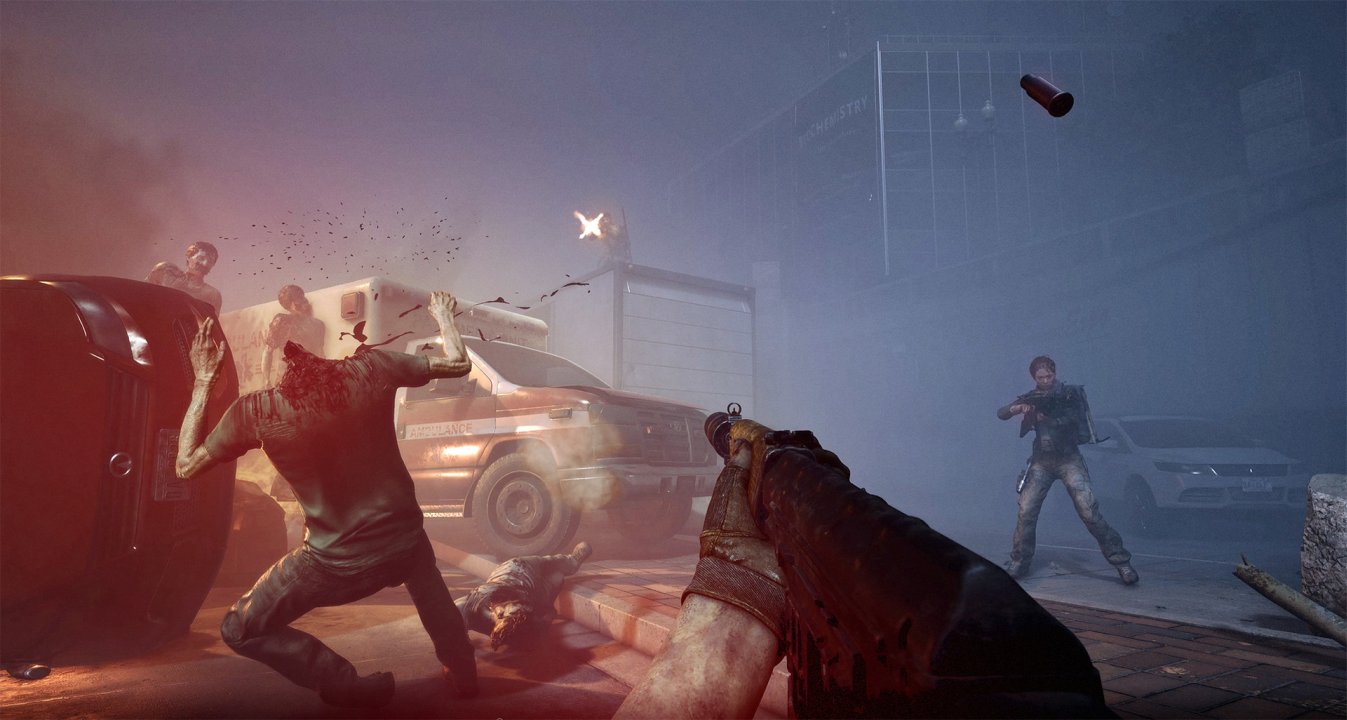
The presentation is quite underwhelming, and certainly not up to par for a full priced title. The texture work is muddy and low on detail, the levels you'll explore are fairly generic, with copy pasted enemies. Animations are re-used and crudely put together. Visual effects from gunfire or explosions are quite basic, and audio is equally barebones, including a dull and repetitive soundtrack and the most rudimentary of effects. On PC, the game offers just a few customization settings, and a choice of just three resolutions, all at 16:9 aspect ratio. If you want to play with another aspect ratio, you have to choose Borderless Window option, which messes up many of the game's UI elements, making many menus annoying to navigate.
Overkill's The Walking Dead is a shambling atrocity. It’s a full priced game that has the level of polish, mechanics, and gameplay design of a budget title. It's far too challenging for no reason, forcing you to replay the same boring scenarios time and again due to a very low reward system. It loses tension very quickly and becomes a tedious slog that yields nothing if you fail. With the added connectivity issues, general lack of polish, and poorly designed meta systems, it's a game that wastes its potential as a zombie title and as a licensed Walking Dead property. There aren't enough positive things to scrape together to make this worth playing for either group of fans.
 Comments
Comments

















